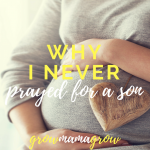 As parents, one of our deepest, most powerful desires in life is to raise our children to be God-fearing, principled, and successful in every sense of the word. Perhaps that is why motherhood is one of the most guilt-ridden jobs on earth. The sight of spoiled lettuce in the fridge or dirty fingernails is enough to make you feel like the worst mom ever. You just can’t escape the guilt—and when you do, you will find it in another’s eyes and hear it in her voice.
As parents, one of our deepest, most powerful desires in life is to raise our children to be God-fearing, principled, and successful in every sense of the word. Perhaps that is why motherhood is one of the most guilt-ridden jobs on earth. The sight of spoiled lettuce in the fridge or dirty fingernails is enough to make you feel like the worst mom ever. You just can’t escape the guilt—and when you do, you will find it in another’s eyes and hear it in her voice.
Subjects like schooling, health decisions, working mothers, how to discipline, Quran memorization, and childhood shyness make many parents bristle defensively and either retreat or attack. Rarely among mothers can you find a spirit of healthy debate, curiosity, and active listening, without the distracting feelings of insufficiency and sensitivity about their parenting choices. Yet those conversations with other families, if we can muster the maturity to listen without taking it personally, can be one of our greatest sources of inspiration and creativity.
So let’s get over the guilt! Purify your intentions, pray istikhara, think carefully and do your research, consult with experienced people who understand your circumstances. Then, give yourself a break. Part of your success in implementing your decisions will be the degree of conviction you have in taking action, rather than the exact nature of your decisions. It is difficult to be creative, diligent, and come up with unique solutions when your choices are the result of succumbing to outside pressure. And inevitably, our children will sense our hesitation and wavering. If I feel insecure and criticized by alternate choices, I will inevitably distance myself emotionally from the people who can potentially be my greatest source of support and new ideas. That is not to say that we should be so set in our ways and unwilling to consider alternative approaches, but rather that we should not be in the business of comparing ourselves to others and should nurture the ability to make informed, confident choices.
This timeless hadith, which refers more to a strength of will than a physical strength, can help us grow in our confidence as parents and convey that self-assurance to our children:
“The strong believer is better and more beloved to God than the weak believer, although in both lies goodness. Keenly pursue what benefits you, seek help only from God, and do not give up. If something befalls you, do not say, ‘If only I had done this or that,’ but rather say, ‘God’s will be done,’ for ‘if only’ opens the door to Satan’s interference.” (Sahih Muslim)
Once we have reached some equanimity about our decisions, we will be able to actively listen to others, extracting the wisdom relevant to our own unique situation. Maybe if we change the way we exchange ideas we can actually stumble upon some deeper parenting truths for Muslims in America that supersede the polar, socially charged choices any individual may make.
I do think there is a secret formula out there for successful, Muslim American parenting that we can attempt to capture through our collective experiences. It has less to do with whether your child plays with wooden or electronic toys, whether the mother works or not, or what school you can or cannot afford, and much more to do with broad attitudes and practices.
How present you are with your child, how patient and purposeful your interactions are, and how well you model good character and habits, is more important than whether you are a working or stay-at-home mom. Instilling a natural curiosity and love for knowledge, ensuring the presence of good role models, and nurturing a strong connection to society matters more than any specific schooling method. Making sure your children feel a deep connection and love for the Quran and apply its guidance in life is more important than how many surahs she has memorized.
How dependent we are on Allah swt, how sincere we are in making our parenting an act of worship, and how deeply we recognize that we are powerless as parents without His guidance, is infinitely more important than our dazzling mastery of parenting techniques.
We waste time and energy by excessively worrying about the specific details, while we should be working to apply the overarching, much more challenging principles. Our implementation will vary according to our personalities and abilities, our family situations, and our children’s unique natures. The specific choices are tiny details in a much bigger picture, only a small part of which any of us have been given control of and will be judged upon.
How our children turn out in the end is truly in God’s hands, and that should bestow us with a sense of humility in our parenting decisions. Maybe we can also learn to lean on each other’s shoulders a lot more than we are accustomed to. A dose of humility and a touch of self-confidence can help our parenting conversations, and on another level our sisterhood, evolve from aggressive and defensive, to supportive and pioneering.
Maha Ezzeddine
Maha is a homeschooling mother of four children (6, 4, 2, and 1) and lives in Michigan. She is an active MAS worker and loves being in nature, writing, and working for Islam. She blogs occasionally at Even Sparrows Pray.











